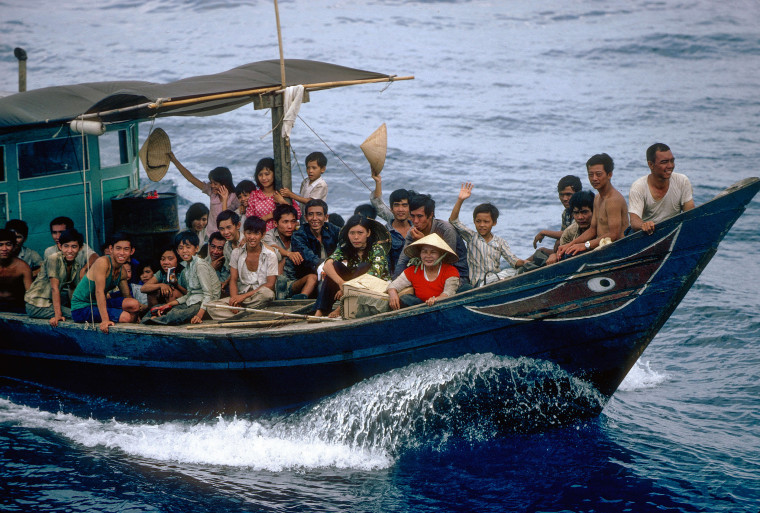It's been 45 years since thousands of Southeast Asian refugees settled in the United States, yet, as a group, they continue to face major socioeconomic challenges that have long been masked under the "model minority myth," which portrays all Asian Americans as successful, according to a new report.
The report, “Southeast Asian American Journeys, A National Snapshot of Our Communities,” released last week, illustrates the experience of the community, from its migration to the U.S. to the present day.
One of the key findings is that across the country, nearly 1.1 million Southeast Asian Americans are low-income, and about 460,000 live in poverty. Hmong Americans fare worst compared to all racial groups across multiple measures of income.
Southeast Asian Americans account for 2.5 million of the U.S. population and 14 percent of the Asian American population, according to the report. Refugees from Vietnam, Cambodia and Laos began migrating en masse in the 1970s after the end of the Khmer Rouge regime, the Vietnam War and the U.S. "Secret War" in Laos.
The group became the largest resettled refugee population in American history, with more than 1.1 million Southeast Asians moving to the U.S. over three decades.
“The narrative that we’re hoping to share with America is that this is a uniquely American community that was created by American forces, and that this is our call for our country to also be responsive and responsible for the adverse systemic issues and challenges that our communities continue to face,” said Quyen Dinh, executive director of the civil rights nonprofit Southeast Asia Resource Action Center, which wrote the report with the nonprofit Asian Americans Advancing Justice – Los Angeles.
Southeast Asian Americans still struggle with socioeconomic insecurity and inequitable education opportunities, and remain heavily dependent on public health insurance for survival, according to the report. They also continue to be affected by decades-old mandatory detention and deportation policies.
The U.S. lacked a unified refugee resettlement system when Southeast Asian refugees began coming to the U.S. in the 1970s, the report's authors wrote. Resettlement was carried out by the State Department and volunteer groups that weren't provided with clear guidelines on how to help refugees.
“Without an understanding of the unique needs and circumstances that these refugees had endured as a result of trauma from the war and its aftermath, they were treated as voluntary migrants who were expected to achieve economic self-sufficiency and independence very quickly,” authors wrote.
Refugees also faced racism and were often resettled in poverty-stricken areas with little to no support.
As a result of continued socioeconomic security, Southeast Asian Americans struggle with housing instability, according to the report. All subgroups also have lower than average homeownership rates, except for Vietnamese Americans, who are at the average rate of 65 percent.
In educational attainment, the report found that Cambodians, Laotians and Hmong had the lowest high school and college graduation rates.
When it came to health, the report found that Southeast Asian Americans are less likely to have health insurance compared to the average population and Asian Americans overall. But authors noted that uninsured rates dropped among all subgroups after the passage of the Affordable Care Act. The largest decreases were in among Cambodian Americans (20 percent to 15 percent) and Laotian Americans (18 percent to 14 percent).
Southeast Asian Americans have also been affected by a rise in immigration detentions and deportations under the Trump administration, which has caused stress and financial strain on affected individuals and their families.
While the report illustrates the community's continued struggle, it also includes data and input from community members that highlight Southeast Asian American potential, successes and advocacy work.
“Through the narratives as well as the data, you see a community that has come from tremendous resilience, being survivors of war and also survivors of acculturation and poverty in the U.S.,” Dinh said.
The report also noted that the community posts higher rates of voting age members compared to Asian Americans overall.
Vimala Phongsavanh, organizing director of the Congressional Progressive Caucus Center and board member of Laotian American National Alliance, said last Thursday during a call when the report was released that this particular point reflects the untapped political power in the community.
“We have a lot of potential to build as a community,” she said. “We can fight for policies and fight to make them a reality and really make our communities a better place.”
The authors of the report offered several policy recommendations based on the findings, including ensuring a full and fair count of Southeast Asian Americans in the 2020 census. Breaking down data on the community is key to advocating for policies that promote equity in the community, Dinh said in the report. Authors also suggested encouraging the publication of such data to help understand the unique disparities in the Asian American Native Hawaiian Pacific Islander community.
Other recommendations included making ethnic studies curricula more accessible to boost high school graduation rates; investing in community programs to help keep youth off the streets; increasing funding to provide culturally and linguistically appropriate care; and ending mandatory detentions and deportations.
“My hope is that this report is an opportunity for the community to feel seen and heard and to also feel empowered to really call for change in making this country our home,” Dinh said
